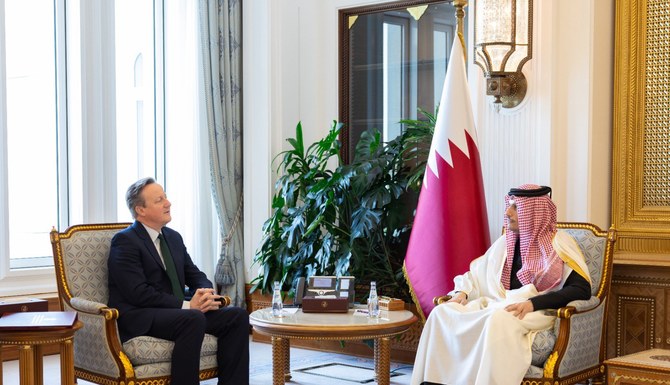London: Plans to build a “humanitarian city” for displaced Palestinians in Gaza would amount to creating a concentration camp, former Israeli Prime Minister Ehud Olmert has said.
The plan, outlined by Israeli Defense Minister Israel Katz last week and backed by Prime Minister Benjamin Netanyahu, proposes to relocate around 600,000 Palestinians — and eventually Gaza’s entire population of over 2 million — to the site in Rafah. Once there, they would only be allowed to leave if traveling abroad.
“It is a concentration camp. I am sorry,” Olmert told The Guardian. “If they (Palestinians) will be deported into the new ‘humanitarian city,’ then you can say that this is part of an ethnic cleansing.”
He added: “When they build a camp where they (say they plan to) ‘clean’ more than half of Gaza, then the inevitable understanding of the strategy of this (is that) it is not to save (Palestinians).
“It is to deport them, to push them and to throw them away. There is no other understanding that I have, at least.”
Israeli legal experts and journalists wrote to Katz last week warning that “under certain conditions it could amount to the crime of genocide.”
Olmert also condemned the uptick in violence by Israeli settlers against Palestinians in the occupied West Bank, criticizing complicity by Israeli authorities and calling the deaths of two men recently, including a US citizen, war crimes.
“(It is) unforgivable. Unacceptable. There are continuous operations organised, orchestrated in the most brutal, criminal manner by a large group,” he said.
“There is no way that they can operate in such a consistent, massive and widespread manner without a framework of support and protection which is provided by the (Israeli) authorities in the (Occupied) Territories.”
Discussing extreme right-wing Israeli Cabinet ministers pushing the violence in the West Bank and using language such as “cleanse” in relation to Gaza, Olmert called them “the enemy from within,” warning that their rhetoric and actions would fuel anti-Israel sentiment.
“In the US there is more and more and more expanding expressions of hatred to Israel,” he said. “We make a discount to ourselves saying: ‘They are antisemites.’ I don’t think that they are only antisemites, I think many of them are anti-Israel because of what they watch on television, what they watch on social networks.
“This is a painful but normal reaction of people who say: ‘Hey, you guys have crossed every possible line.’”
Olmert said that although he backed the initial invasion of Gaza after the October 2023 Hamas attack, he is “ashamed and heartbroken” at how Israel’s government has prosecuted the war and abandoned peace negotiations.
“What can I do to change the attitude, except for number one, recognising these evils, and number two, to criticise them and to make sure the international public opinion knows there are (other) voices, many voices in Israel?” he asked.
Saying he believes the Israeli military’s actions have caused “the killing of a large number of non-involved people,” he added: “I cannot refrain from accusing this government of being responsible for war crimes committed.”
However, he voiced hope that peace and a two-state solution are still possible, telling The Guardian that he is working with former Palestinian Foreign Minister Nasser Al-Qidwa to lobby the international community to help make it happen.



























